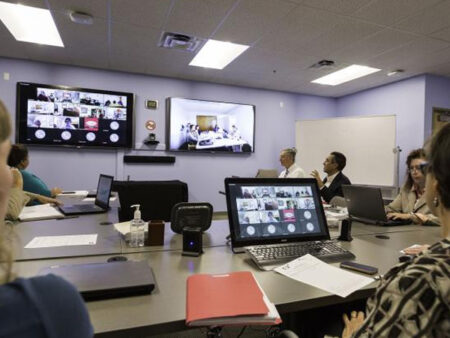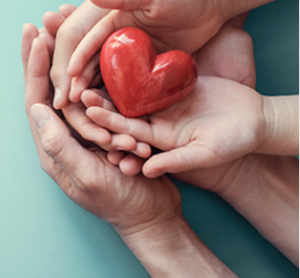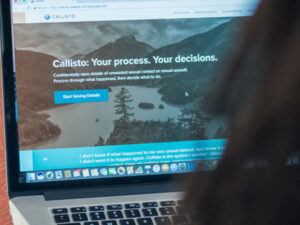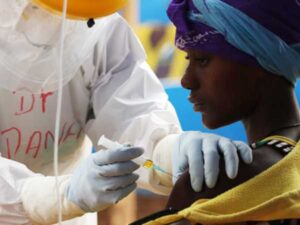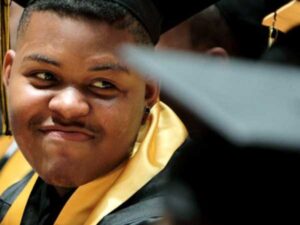Project ECHO spreads knowledge about healthcare best practices by leveraging technology and case-based learning.
Sanjeev Arora of Project ECHO spoke with Sandra Oshiro on February 15, 2023. Click here to read the full conversation with insights highlighted.
Sandra Oshiro: Could you introduce yourself with a full name, a title, and your affiliation?
Sanjeev Arora: My name is Sanjeev Arora. I’m a gastroenterologist by profession. I serve as the director of the ECHO Institute at the University of New Mexico Health Science Center. Project ECHO is a movement that we launched in 2003 to democratize the implementation of best practices all over the world.
Sandra Oshiro: Can you describe the problem you are addressing at the moment and how you are responding to it? How is the world going to change with your response to the problem before you, and if you could detail just why people should care about this?
Sanjeev Arora: The problem that we are tackling is that in healthcare, the right knowledge doesn’t exist at the right place at the right time, especially in countries which are classified as low and middle-income countries. Rural patients, urban patients in the Global South don’t have access to good care because often, the healthcare providers taking care of them don’t have the right knowledge at the right place at the right time, and so it’s impossible for them to get the right care. The ECHO model was developed for the purpose of improving equity, and we do this with the ECHO model to democratize the implementation of best practices so that no matter where somebody lives in the world, they can get good healthcare, they can have the right knowledge at the right place at the right time, to provide the right care at the right place at the right time. This has the potential to save millions of lives all over the world.
Sandra Oshiro: What makes your approach distinctive, different from others who have gone down this road as well?
Sanjeev Arora: What makes it distinctive is the ECHO model, which is a model to exponentially improve capacity of care through the use of technology to leverage scarce expertise, sharing best practices amongst experts and learners, which are widely distributed. The heart of ECHO is something called case-based learning, where learners present cases or real problems that they’re encountering in the field, and altogether, multiple learners and experts discuss cases, learn from each other. We call this idea all teach, all learn. We have demonstrated through outcome tracking that dramatic improvements occur in the quality of care provided by these learners in an exponential way, so that one ECHO project can potentially improve the care for tens of thousands of patients over time.
Sandra Oshiro: Can you share an example that illustrates the impact of your work?
Sanjeev Arora: In 2002, I went into my clinic at the University of New Mexico, and I saw a patient there, and she was a 43-year-old woman. Along with her in the room was a 14-year-old boy and a nine-year-old girl. I asked her, “How can I help you?” She said, “I have hepatitis C and I want treatment.” So I said, “How long have you had it?” And she said, “I’ve had it for eight years.” So I said, “Why did you not come earlier for treatment?” And she said that she’d called my nurse, and there was an eight-month wait to see me, and she lived 200 miles away. There were no specialists in her rural area in New Mexico. And she would have to take chemotherapy for this disease, with weekly injections and pills, and make 12 trips, 200 miles each way. She said, “I’m a single mother and there was no way I could take so much time off work, so I decided not to get treatment.” I asked her, “Why did you come today?” And she said, “I’m having pain here in the right upper side of my abdomen.” I examined her liver with an ultrasound and found she had a cancer halfway between the size of a golf ball and a tennis ball, and she passed away six months later, leaving these two children. And I was asking myself, “Why did she die of a disease that I knew how to treat?”
This problem was occurring again and again, that people were dying because the right knowledge didn’t exist at the right place and they couldn’t get to it. The challenge was there were 28,000 patients with hepatitis C in New Mexico and less than 1,500 had been treated. I was treating somewhere between 100 and 150 a year, because this was complicated treatment and I was trying to figure out, “How should I save the lives of all these people by bringing them access to treatment?” and that’s why I developed the ECHO model. I said I would use technology to leverage my expertise, one-to-many video conferencing. It’s common today on the Zoom platform. It wasn’t so common in 2003.
The second key idea of Project ECHO was to share best practices. I went around the state of New Mexico and set up 21 new treatment sites for treating hepatitis C in New Mexico by primary care. But when I gave them the protocol, they said, “No, we can’t do this. This is too complicated.” So I asked myself, “How did you become an expert in treating Hepatitis C?” When I did my fellowship in gastroenterology in Boston, during my training, I would see a patient and present to my professor, see another one and present to my professor, and after two years, they said, “You’re a gastroenterologist.” So I said, “Aha. I’m going to use this iterative guided practice model or case-based learning to create new hepatitis C experts in New Mexico, where there weren’t any.”
The heart of ECHO is this knowledge network. Starting Wednesday afternoon, all 21 would join, very much like you’ve joined me on a Zoom conference today, except there would be 21 squares there. And first, Sandra would present a patient to everyone, then Dan would present a patient, then John would present a patient, then Nancy. In two hours, we would co-manage about eight patients, and then I’d give them a lecture for 15 minutes. As I did it week after week, what happened was the wait in my clinic started falling, and in 18 months, the wait fell from eight months to two weeks. Over the next many years, we treated more than 10,000 patients. Anyone could get care in their local community.
We published in the New England Journal of Medicine a head-to-head study showing that these rural doctors, as long as they were supported by an ECHO model, could produce the same level of care. They could literally give chemotherapy in a rural area and had become experts, just like I was, and the capacity to treat this disease had gone up 20 times. Everyone could benefit. Once this happened, then, of course, we said it could be used for any number of other diseases, and we used it for diabetes, and HIV, and chronic pain, and mental health and addiction, so now we have 70 different disease areas.
Of course, the most important thing was how we can help a billion people, and to help a billion people, we said we would train any university, any not-for-profit, any academic center in the world to treat hepatitis C, give them our model. But not only hepatitis C. Give them the software tools, the platform so they could use it for any disease they wanted. And currently, we have close to 3,000 networks in the world. We have 4.1 million learners in 193 countries, and the model is being deployed all over the world to improve care, improve access to care, improve quality of care, and do it in a very cost-effective way.
Sandra Oshiro: That case that you told us about, it’s so heartbreaking, but it inspired such great work. I wonder if you could give us some insights or teachable lessons that can be taken from what you’ve done that others could use?
Sanjeev Arora: One key insight that I’ve had is that it was originally the insight of Margaret Mead, and that is, “Never doubt that a small group of dedicated people can change the world. Indeed, nothing else ever has.” And right now, the World Health Organization, the US government, The Global Fund, African region, multiple large agencies all use the ECHO model, and this just happened because there was a small team of people who were absolutely dedicated to improving the world.
I think another insight I had was that the purpose of ECHO is equity. A common way human beings think about equity is their thinking of sharing material resources, bringing medicine, bringing more food, bringing money. Of course, these material resources are limited, and also, if I were to give somebody half my money, I would be only left with half. What we discovered was that knowledge has a completely different physics than material resources. It actually spreads more like love and joy rather than like money. So when experts democratize their expertise and help other people implement it, it’s not only that they’re giving something from themselves, they are also learning from these learners who actually have a better understanding of how healthcare should be deployed in the very periphery of our healthcare system. They know the culture, they know the value system, they know the economic constraints.
The insight is that sharing expertise, especially in a model like ECHO, where all teach and all learn, one-to-many telementoring, shows that the actual amount of knowledge grows in the world. It’s not a zero-sum game. What happens is it produces joy of work. It helps with recruitment, retention of people in rural areas. It also has this enormous benefit of building communities of practice, so people are not isolated. All of this together leads to a very different generative process, a sort of reduction occurs and new solutions are created. Everyone is richer for it. That is a key insight, and I would encourage other people who have expertise of any different kind to use the ECHO model to democratize their expertise and bring joy into their own life as well as doing good for the world.
Sandra Oshiro: Can you tell us a little bit about how you measure success? What is the evidence that you are making progress?
Sanjeev Arora: We have 505 peer-reviewed publications in the leading journals in the world showing that ECHO works. There are multiple levels of evidence here. The first is showing that doctors have increased self-efficacy. It increases their professional satisfaction, it reduces their professional isolation, it produces joy of work for them. There is a second level of evidence, a higher level, showing that the knowledge that they have increases with time as they participate in ECHO. A third level of evidence that we have here is that we are able to demonstrate that their practice patterns improve. That is, they prescribe the right medicine, they make the right diagnosis, and they deploy the treatments that we have taught them to deploy. They do the right thing.
A higher level of evidence than that is we can measure patient outcomes. For example, in the paper that I published in the New England Journal of Medicine, I assured rural doctors that they could get chemotherapy to your patient and these rural doctors could deliver chemotherapy to patients. But that’s not enough. They could get exactly the same outcomes as I was getting at the university. We have 73 publications from all over the world. We currently have 905 hubs in 65 countries, but our learners are in 193 countries, and all of these people are doing research and demonstrating outcomes of effectiveness. We currently have two publications coming out every week on the effectiveness of ECHO. And lastly, there are at least eight publications showing that community health outcomes can improve because you saturate a community with new knowledge which didn’t exist, and it’s done through this guided practice, all teach, all learn model, where you create contextually-relevant solutions, not just what a University of New Mexico professor thinks should be done, but how does the learner in rural New Mexico, or in Rwanda, or Gambia think it should be done.
Sandra Oshiro: It sounds like this has gone international. What are some of the countries that you’re involved with?
Sanjeev Arora: Our learners are in all 50 or so African countries. In terms of learners, practically every country is there. But the hubs are typically an academic center or a ministry of health. For example, India is a country where we have 200 hubs. It’s a huge deployment. In Africa, we have hubs in Côte d’Ivoire, in Kenya, 20 hubs. We have Uganda, Zambia, Rwanda, Sudan, South Africa. I could go on and on. There are 905 of them, 380 hubs in the United States. They are all the leading universities, like Stanford, University of Washington, University of Chicago, Johns Hopkins, MD Anderson. But more than 50% of our hubs are in lower to middle-income countries in Latin America, in Southeast Asia, in Indonesia, Malaysia, Vietnam, Pakistan, and India, and so on and so forth.
Sandra Oshiro: As a social innovator, you learn things, no doubt, from events that don’t work. And we want to ask you, can you describe something that you tried that didn’t work but that taught you an important lesson, something that others could learn from as well?
Sanjeev Arora: One of the things we did learn is that video conferencing is important because it’s not so much just a knowledge network. When I designed it, I thought of it as a knowledge network. What we learned later is that it’s a social network. It produces joy of work for people, and what makes ECHO work is relationships, empathy, kindness, love, and working on important problems together. In places where they don’t have adequate bandwidth to do video, ECHO doesn’t work quite as well. Sometimes, we have to make community health workers travel for an hour for their once-a-week ECHO meeting so that they can participate in video, because if they are just a black screen or on the phone, it doesn’t work as well. I think what I learned from this was that relationships are what make the world go round, not just knowledge in itself. It’s somewhat sterile. Working together on important problems is necessary.
Another weakness we identified of ECHO earlier on was, in low and middle-income countries, the vast majority of care delivered to low-income patients, which is our predominant target audience, is provided by the government. What we learned as a result of a few failed experiments earlier on in the history of ECHO, which has been going on for 20 years, was that for ECHO to be successful in a low-income country, it has to be perfectly aligned with the priority of the government. It’s not like Sanjeev Arora can come to Sudan and say, “This is what you should do with ECHO.” Instead, we have to go to the government in Sudan and say, “What are your priorities in your country? What are the goals you want to achieve?” and then explain ECHO, provide our technologies, our platform to make the argument that ECHO will help you achieve your goals with speed, with scale, with higher quality and at much lower cost.
To give you an example, I was just in Nairobi in Kenya, where the US government has a very large program for HIV care. This is a US government PEPFAR-supported project where it was costing them $820 per doctor they were training on HIV in Western Kenya. They deployed the ECHO model, and now, they can train one doctor for $20. So you can see they can do 40 times the amount of work for the same amount of money. What they told us, which was more important than the cost, was it is now more effective, because ECHO is a high-frequency, low-dose, ongoing weekly mentoring, and doctors don’t have to travel to Nairobi for a three-day course and then be on their own for a year implementing what they learned. It is ongoing, case-based situated learning, that is, they’re learning on the problem that they’re having and solving those problems. Through the process of this guided practice, they’re going from novice to expert, and you can do it for 40 times less cost. But this could not happen if it’s not a priority of the government, and I think that’s a very key insight.
Sandra Oshiro: Could you also talk a little bit about what work you’re doing to advance this system level in your field? That is, how specifically are you doing that? Are you doing that with partnerships, with leveraging technology, obviously, that is a part of it, policy change, or a combination of these?
Sanjeev Arora: It is a combination of all of these, but how we evolved to this place was that we realized that ECHO was working, but there are only two and a half million people living in New Mexico, and 6 billion people in the world don’t have the right knowledge at the right place at the right time and millions are dying unnecessarily. There’s a huge mismatch about where we were and the scale of the problem. The question that came was, were we going to do this ourselves? And we came to the decision, no, that would be too slow. We said, “Just like a principle of ECHO is for an expert to democratize his or her expertise, why don’t we democratize our expertise on how to do ECHO, get a worldwide Zoom license,” which we now have, “and give it freely to everybody at no cost to them, develop a platform to track and evaluate ECHO, issue digital certifications, and conferring medical education credits, et cetera?”
So package this in a system, which we could go to a Johns Hopkins and say, “Look, this is for free, to help you achieve your mission in life, to help people in Africa or Latin America, wherever you want to work, or in rural Maryland. It doesn’t matter. We have developed this platform, and we give it to anyone in the world who wants it, who has a mission for equity.” We ask them to apply it in any area. It’s mostly health, but also in education. We have close to a hundred networks now, where there’s a principal agent at the frontline who if you upskill a teacher, a doctor, or a nurse, you can have a huge impact in your community. If there’s a principal agent that can make a big difference, if equity is their goal, if they have someone who’s willing to democratize their expertise with guided practice, case-based learning, and all-teach all-learning, then essentially, a very unique thing has happened. Now, this organization, by adopting the ECHO model, can achieve their objective of speed scale, high quality, and low cost.
That’s really our model for global spread. Organizations like the World Health Organization have taken it up, and the US CDC has taken it up, and the National Cancer Institute in Washington, DC has taken it up, too, because they want to improve care for cancer.
Sandra Oshiro: What do you think is most needed at this point from other actors, other partners to advance the systems-level change that you’ve initiated?
Sanjeev Arora: I think in different countries, different things are needed. In the United States, clearly policy change is needed so that the healthcare system can support a platform whose sole purpose is to upskill the workforce so the competence of a healthcare worker in the field can match the need for knowledge and expertise. Right now, there’s a huge mismatch, and everybody’s trying to go and see a specialist in the city, and it’s really difficult. Low-income patients in the United States have very poor specialty [healthcare] access. Figuring out a way to sustain such a system is important from a policy perspective. The advantage to the United States would be improved quality and a significantly lower cost, reduced travel cost, reduced cost of untreated disease which occurs, late treatment of disease, unnecessary deaths, and so forth.
I think for low-income countries, we do need some more philanthropic support, because it’s a completely difficult conversation to have to go to the government of Uganda and say, “We are the United States, and we want you to pay us so we will bring ECHO to you.” That just doesn’t work. It fundamentally faces a huge barrier even to communicate such a message to a country like that. So far, our work has focused on low-income countries in Africa, in low to middle-income countries like India, in low-income countries in Latin America, and all that work has been supported by philanthropy.
Sandra Oshiro: How do you see your work evolving over the next five years?
Sanjeev Arora: There are sort of two broad areas of evolution. The first is, a lot more work needs to be done in healthcare. We have a vision which is different from the current state. The current state is that a doctor goes to medical school and residency in Uganda or in New Mexico and then goes into practice, is living in a rural area for 30 years, and has to keep up with all this knowledge on their own in a world where medical knowledge is doubling every three and a half years, and it’s a challenge. There is this continuous mad rush to see specialists all over the world, and what we want to do is provide the care to patients close to their home by people who have the right knowledge and expertise. What we are seeing is that with the current exponential growth of knowledge in the world, you need a new system to completely mentor and support this healthcare workforce throughout their life, because they are truly making life and death decisions, and they need support.
That’s, at a conceptual level, our vision for the whole world. Now, because 6 billion people don’t have it, much more work needs to be done. Then there is another huge area that has the potential for massive impact, and that is the field of education. Imagine a child in rural Uganda who has the talent and the interest in hard work but doesn’t have a teacher who can teach them. How are you going to get a teacher to this child? Something like ECHO can make a big difference there by mentoring school teachers to be better teachers by bringing the latest technologies to them, the latest methods of teaching. Upskilling in the educational workforce is important.
I think a third area, which has been a big focus recently, is this issue of gender equity. One of the biggest challenges we see in low-income countries in Africa, is extreme that the opportunities for women are significantly lower than for men. This has a huge negative impact on society when half the talent in a country is untapped for its full potential or its full capacity. We want to help the world because we have an exponential model for capacity building. We want to help the world understand issues of gender equity and give them the tools to improve the lives of women in the world, because women are the nucleus of a family, and by improving the life of a woman, you improve the health of the society overall. Too many women, for example, died of a purely preventable and highly treatable disease like cervical cancer. It’s really mind-boggling that we cannot get HPV vaccination into girls in most parts of the world because we don’t have the systems, we don’t have the trained workforce, and so on and so forth. There’s a lot of work to be done. We’re not resting anytime soon, and the ECHO movement is growing.
Click here to read the full conversation with insights highlighted.
Sandra Oshiro is a veteran journalist and a freelance writer, editor and digital strategist. She is pursuing a doctoral degree in educational technology and advocates for employment and affordable housing for those with disabilities.
* This interview has been edited and condensed.
Find other organizations leveraging tech for social innovation.

